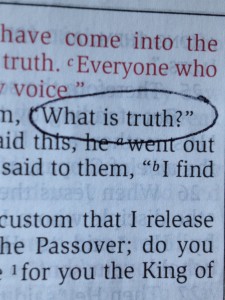A priest, a rabbi and an Imam walk into a bar. The bartender says, “What is this, a joke?”
Some say “all paths lead to God.” That’s a wonderfully inclusive thought and the open-minded people all nod in agreement. No one has a monopoly on the truth! It’s an enlightened attitude until we actually explore the concept of “truth.”
Not to get all metaphysical, but the law of non-contradiction states that contradict ory statements cannot both be true in the same sense at the same time. So, if one religion claims so-and-so is the last and greatest prophet and he speaks for God, then it is either true or untrue. If it is not true, then followers of that prophet had better brace themselves for an unpleasant judgement.
ory statements cannot both be true in the same sense at the same time. So, if one religion claims so-and-so is the last and greatest prophet and he speaks for God, then it is either true or untrue. If it is not true, then followers of that prophet had better brace themselves for an unpleasant judgement.
Christians believe that Jesus is the embodiment of God. Jesus is the god we can see and touch, and He reveals all truth about our Heavenly Father and life itself. That is either a true statement or it is false. I have staked my own eternity on the answer.
“Again the high priest asked him, “Are you the Christ, the Son of the Blessed?” And Jesus said, “I am, and you will see the Son of Man seated at the right hand of Power, and coming with the clouds of heaven.” – Mark 14:61-62
The writer C.S. Lewis once famously addressed the issue of people who say that Jesus was merely a great teacher, in the category of Plato and Gandhi. Lewis wrote, “a man who was merely a man and said the sort of things Jesus said would not be a great moral teacher. He would either be a lunatic — on the level with the man who says he is a poached egg — or else he would be the Devil of Hell. You must make your choice. Either this man was, and is, the Son of God, or else a madman or something worse.”
When it comes to truth about God, we all must make a choice. If Jesus was not God then I’ve wasted a lot of money on Christmas gifts. If you believe that He (note the upper case “H”) was God incarnate, you have reached a profound conclusion, but you also have raised some other very important questions: Is the Bible true and infallible? By what means are we reconciled with God; grace or works, or some combination? Are heaven and hell real? A good many church denominations were created based on answers to these questions.
But the first question, the most important question, is this: what is the truth about Jesus… or Muhammad or Buddha or L. Ron Hubbard? Were all of them phonies? Were they all inspired by some higher power? What is the truth?
Among the founders of the great religions, only Jesus claimed to be divine. His followers of that day were completely convinced, so convinced that most died as martyrs. His teachings are transcendent: love your neighbor as yourself, return good for evil, forgive everyone, help those in need, etc. They present a blueprint for a peaceful, joyful world. Compare that philosophy with the Muslims, who are instructed to kill infidels, and they will issue a fatwah if you so much as use a Koran for a coaster. How about Hindus and Buddhists, whose belief in karma is such that they are reluctant to help beggars, orphans and widows who (they believe) are suffering for misdeeds in a past life.
At his trial, Jesus explained to the Roman Governor Pilate, “I was born and came into the world to testify to the truth. All who love the truth recognize that what I say is true.”
Pilate replied, “What is truth?”
Indeed, that is a great question. Religious scholars have sought the answer for centuries. The truth is surprisingly easy to find, hidden before us in plain sight. Study the Gospels yourself and come to your own conclusion. The truth is in there… no joke.
“Jesus said to him, “I am the way, and the truth, and the life. No one comes to the Father except through me.” – John 14:6
- Is it bad to think one religion is “right” and all the others are “wrong?” Why or why not?
- Why do you think your views of God are correct?
- What happens to really good, moral people of other faiths when they die? If they go to hell, what does that say about the Christian God?

